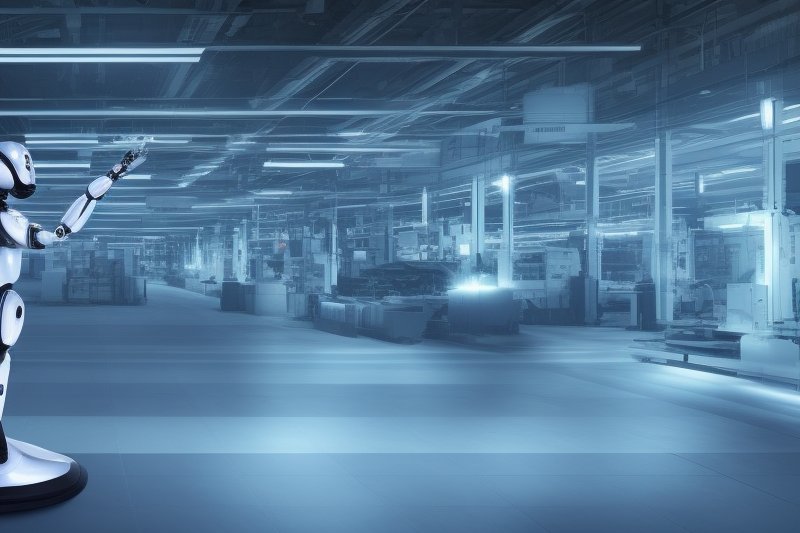Smart Industry Forum 2023
Explore the latest advancements in technology and its impact on the manufacturing and supply chain industry
Smart Industry Forum, the premier event for senior technology and business leaders in the manufacturing, logistics, warehousing, and supply chain industry in Africa. This forum will bring together industry experts, thought leaders, and key decision makers to discuss the latest advancements in technology and its impact
on the manufacturing and supply chain industry.


As the fourth industrial revolution continues to unfold, Industry 4.0 technologies such as artificial intelligence, the Internet of Things, and blockchain are reshaping the way we approach manufacturing and logistics. The manufacturing sector holds great promise for Africa as it navigates its post-pandemic recovery. According to experts, the sector is expected to reach $666.4 billion by 2030, a significant increase of over $200 billion from its 2015 figures.
Topics to be covered
At the forum, attendees will have the opportunity to hear from industry leaders on topics such as:
The future of logistics and supply chain management
The impact of Industry 4.0 on workforce and skills development
Real-world examples of Industry 4.0 success stories in Africa
Smart factories and Industry 4.0 technologies in improving efficiency and productivity in manufacturing
The use of data analytics and machine learning in the supply chain
The impact of Industry 4.0 on the design and development of new products
Cybersecurity considerations for Industry 4.0 and smart factories
The use of virtual and augmented reality in the manufacturing process
Best practices for implementing Industry 4.0 technologies
The role of robotics and automation in Industry 4.0
The use of blockchain in supply chain management and logistics
The impact of Industry 4.0 on global trade and logistics network
Target Audience
This event is designed for senior leaders in the manufacturing, logistics, warehousing, and supply chain industry, including CEOs, CTOs, CIOs, and heads of operations. Don’t miss this opportunity to gain valuable insights and network with your peers in the industry.
CEOs and C-level executives in the manufacturing, logistics, warehousing, and supply chain industry
Heads of operations and departmental managers in the manufacturing, logistics, warehousing, and supply chain industry
Technology leaders and decision makers in the manufacturing, logistics, warehousing, and supply chain industry
Supply chain and logistics professionals
Manufacturing and production managers and engineers
Business Development and strategy leaders from the manufacturing and supply chain industry
IT/OT leaders and professionals
Researchers and academics in the field of manufacturing and supply chain technology
Government officials and policymakers interested in smart industry
Investors and venture capitalists looking for opportunities in smart industry
Speakers

Harry Hare
Chairman, dx⁵

Judy Ngure
Information Security Consultant

Sam Muthui
CISO, Blurok Africa

Gilbert Mutai
Head of ICT, Car & General Ltd.

Stephen Gitahi
Research & Projects - IOT & Wireless Networks Lab, iLab Africa

Timothy Oriedo
Founding Chief Data Scientist, Predictive Analytics Lab

Benard Rono
CIO, KETEPA

John Wachira
Group IT Manager, the Safal Group

Ahmed Abdulwahab
CEO, Next Arabia

Ken Ogwang'
Head of Digital and Technology, Eastern and Southern Africa, Diageo

Ojenge Winston
Head, Digital Economy Programme Africa Centre for Technology Studies & AI/ML, Robotics & Cybernetics Lecturer, The Technical University of Kenya

Isaac Mwangi
Head of ICT, Unga Group

Edgar Okioga
Area Head of Digital Business Solutions West & Central Africa, BAT

Dominic Kebenei
Group Head of ICT, ABM Group

Mudiaga Eboh
Senior Manager, Technology & Service Delivery, Sproxil

Carol Koech
Country Director, Schneider Electric

Oladimeji Kazeem
Data Architect, Kaplan UK

Anthony Mwangi
CEO, Kenya Association of Manufacturers (KAM)

Cephas O. Okal
Advisory Board Chairman - CISO Alliances Kenya
Agenda
-
Smart Industry
September 7, 2023
09:00 AM to 05:15 PM
Opening Remarks and Introduction to Keynote Speaker

Harry Hare
Chairman, dx⁵
Cultural Transformation as the Key to Digital Transformation
Cultural transformation serves as the linchpin for successful digital transformation initiatives. This transformational process involves reshaping an organisation's values, mindset, and behaviors to embrace digital technologies and drive innovation. By fostering a culture of adaptability, collaboration, and continuous learning, businesses can overcome resistance to change and empower employees to leverage digital tools effectively. Emphasizing cultural transformation as the foundation of digital transformation is crucial in achieving long-term success.

Anthony Mwangi
CEO, Kenya Association of Manufacturers (KAM)
Digital Transformation and Industry 4.0: Navigating the Revolution
The key to digital transformation is embracing technology-driven
changes and advancements. This is key to thriving in the 4IR. It entails adapting business models, processes, and operations to leverage emerging technologies such as IoT, AI, and big data analytics. How can organisations navigate this revolution? What is the best way to emphasise agility and forward-thinking? How can an organisation identify digitalisation versus digital transformation?
Protecting Your OT From Cyber Threats: First Steps
OT (operational technology) keeps the manufacturing industry running. How protected are your OT assets? If your organisation is among those just getting started on a developing a robust approach to OT cybersecurity practices, this session will cover what steps you should take first. From assessing your existing systems to building a culture of cyber awareness, it will lay the groundwork for designing, implementing, and maintaining a cybersecurity OT infrastructure.

Judy Ngure
Information Security Consultant

Sam Muthui
CISO, Blurok Africa

Gilbert Mutai
Head of ICT, Car & General Ltd.

Cephas O. Okal
Advisory Board Chairman - CISO Alliances Kenya
Coffee Break
The Monetisation Of The Industrial Internet Of Things (IIoT)
The concept of monetisation revolves around leveraging the data and insights generated by IIoT to create new business models, optimise operations, and enhance productivity. By analysing the data collected from connected devices, businesses can make data-driven decisions, improve process efficiency, reduce downtime, and enhance predictive maintenance practices. Additionally, companies can explore opportunities to offer value-added services, create new revenue streams, and deliver personalised solutions based on the gathered data, all while improving the overall industrial ecosystem.

Stephen Gitahi
Research & Projects - IOT & Wireless Networks Lab, iLab Africa
Data Analytics & Smart Manufacturing: Leveraging Big Data For Insights & Competitive Advantage
Incorporating data analytics into smart manufacturing empowers businesses to harness the power of Big Data, gaining valuable insights and a competitive edge. By leveraging advanced data analytics tools and techniques, manufacturers can analyse vast volumes of data generated by connected devices and machines. This enables them to make informed decisions, optimise processes, predict maintenance needs, and enhance overall operational efficiency. Data analytics serves as a game-changer in smart manufacturing, paving the way for innovation and differentiation in a rapidly evolving industry landscape.

Timothy Oriedo
Founding Chief Data Scientist, Predictive Analytics Lab

Mudiaga Eboh
Senior Manager, Technology & Service Delivery, Sproxil

Benard Rono
CIO, KETEPA

Oladimeji Kazeem
Data Architect, Kaplan UK
Putting Digital Twins & Threads To Work For You
Among the most useful concepts to arise from the Industry 4.0 movement is that of the digital twin and its lifecycle counterpart, the digital thread. Effectively a software representation of a particular physical asset, the digital twin is designed to optimise that asset’s operation, including the detection, prediction, and prevention of adverse outcomes in the real world. Even so, what about interoperability with infrastructure? What will digital twins and threads augment or phase out? Is the RoI worth it?

John Wachira
Group IT Manager, the Safal Group
Pioneering Smart Industry in Africa: Unlocking Innovation & Sustainable Growth
The fireside chat will conclude with a call-to-action, inspiring stakeholders to unite in pioneering smart industry initiatives in Africa. By fostering collaboration, embracing innovation, and investing in digital transformation, Africa can position itself as a leading player in the global smart industry landscape, driving sustainable growth and economic prosperity for its people.

Ahmed Abdulwahab
CEO, Next Arabia

Ken Ogwang'
Head of Digital and Technology, Eastern and Southern Africa, Diageo
AI-Driven Smart Industry Transformation: Importance Of Predictive Maintenance
What is the significance of AI/ML in reshaping industries through the integration of smart technologies? Specifically, what is the critical role of predictive maintenance? Should one entrust the organisation solely to algorithms? What is the competitive edge? How does AI-driven predictive maintenance fit into the broader Smart Industry transformation? How can organisations protect data integrity and ensure compliance?

Ojenge Winston
Head, Digital Economy Programme Africa Centre for Technology Studies & AI/ML, Robotics & Cybernetics Lecturer, The Technical University of Kenya
The Human-Machine Collaboration: Enhancing Workforce Skills In The Era Of Smart Industry
The collaboration between humans and machines has become paramount to drive productivity, innovation, and efficiency. This intricate interplay between human expertise and machine capabilities needs harnessing to empower the workforce, enhance their skills, and address the challenges and opportunities presented by the smart industry revolution. This panel seeks to investigate ways to create a harmonious and adaptive work environment. One that utilises the unique strengths of both humans and machines. Can humans really adapt to ever-evolving technological landscapes? How can humans maintain a competitive edge in the ever-changing job market? How should organisations handle job redesign? What are the ethical implications of this interface?

Kevin Namunwa
dxContent Writer, dx5

Edgar Okioga
Area Head of Digital Business Solutions West & Central Africa, BAT

Isaac Mwangi
Head of ICT, Unga Group

Dominic Kebenei
Group Head of ICT, ABM Group

Carol Koech
Country Director, Schneider Electric
Where Does Additive Manufacturing (3D Printing) Fit In Your Supply Chain?
By enabling on-demand manufacturing, businesses can reduce inventory and optimise logistics with just-in-time production. The technology's customisation capabilities empower companies to cater to niche markets and deliver personalised products. Additive manufacturing ensures supply chain resilience by providing localised production and quick spare part manufacturing. With its ability to create complex geometry and lightweight structures, how can 3D enhance product performance and sustainability? How does one fit 3D into their strategy? Is there a viable case study that showcases an organisation embracing more agile, competitive supply chain tailored to modern demands.

Edgar Okioga
Area Head of Digital Business Solutions West & Central Africa, BAT
Closing Remarks and Event Recap

